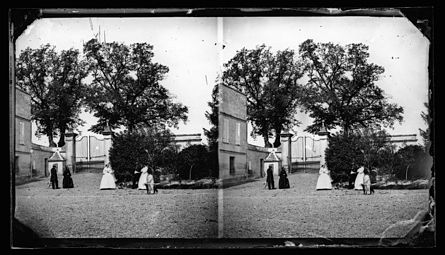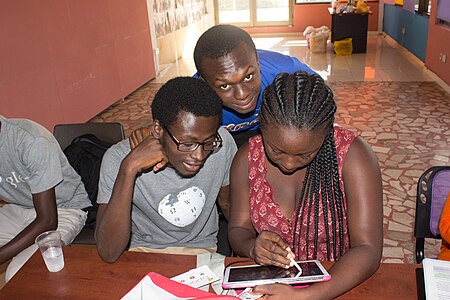Learning and Evaluation/Newsletter/2015/1/4
blogs, events
& more!
on Meta!
We released the first two evaluation reports from Data Collection Round II
Learn more about Wiki Loves Monuments and Other photo events Evaluation reports:
The reports are a collaborative effort of program leaders and the Learning and Evaluation team at the Wikimedia Foundation. The first two releases focus on Wiki Loves Monuments and other photo events, providing a snapshot of their purpose and impact, as well as the resources and efforts that go into their implementation.
Highlights of the first reports show that media uploaded to Wikimedia Commons as part of the Wiki Loves Monuments and other photo events represent 14% of the media uploaded to Commons during September 2013 to September 2014; media uploaded are used in articles at five times the rate of Commons uploads overall, compared to other media uploaded by registered users during the same period of time.
Together with the reports, the Learning and Evaluation team released the first draft of the evaluation overview, which gives readers a bird's eye view of the state of evaluation in the movement. Within Evaluation initiative section, Evaluation Pulse survey show 125% increase in self reports. As we promote a culture of peer-learning and experiment, we are happy to say that 94% of program leaders reported lessons learned, and 87% reported tracking the content areas improved.
In the coming months, we will release reports on the following Wikimedia Programs: Onwiki Writing Contest, Edit-a-thons, Editing Workshops, GLAM Content donations, Wikipedia Education Program, Conferences, Hackathons, Wikipedians in Residence.
We are looking for community feedback on what should be next steps for further investigation. Please comment on the reports' Talk Page!
More info:
This toolkit contains resources tested and refined over the last ten years. Within each section of the toolkit, you will find strategies and solutions to plan, grow and scale up your education program.
Read more about this new resource and how you can help expand it!
This is the first release of a series of program toolkits, that aim at capturing the knowledge in the movement around planning and executing Wikimedia programs. Upcoming toolkits include on wiki writing contests, GLAM content donations and editathons.
The idea behind the Wikipedia Education Program is simple: educators and students share free knowledge by contributing to Wikipedia and Wikimedia projects in an academic setting. Wikipedia is being used as a teaching tool in education around the world.
Over the last ten years, Wikimedians and educators have taught students from diverse backgrounds to contribute to Wikimedia projects. This toolkit contains resources they have tested and refined over the last decade. Within each section of the toolkit, you will find strategies and solutions to plan, grow and scale up your education program. The knowledge around the program implementation has been captured in 3 steps: Plan, Run and Evaluate. One more section invites program leaders: Connect, where users can find related news from Education Programs around the world, and connect with each other.
If you are a program leader coordinating an education program, we need your help! Some steps need expansion, and the topics are indicated with the template «Learning pattern needed».
As this tool is designed for anyone interested in starting, growing or improving an education program, we hope program leaders take it to make the most of it.
Read more:
blogs, events & more!
Every month, we share knowledge with a focus on programs, process or tools on Wikimedia Foundation's blog. Find all our entries on the Wikimedia blog
Featured blog posts:
The Wikimedia movement is increasingly using learning patterns to share what we learn when working on a Wikimedia program (such as an edit-a-thon) or what we learn on an organizational level. These simple documents, that describe solutions to a problem, have become harder to find, as the collection of learning patterns has grown in the past year. Through the new category system, the Learning and Evaluation team made the Learning Pattern Library easier to navigate.
Read more.
Last month, the Wikimedia Foundation launched the Inspire Campaign, inviting community ideas to address gender disparity on the Wikimedia projects, with USD $250,000 of funding available through the IdeaLab. The first phase of that campaign started on March 4th and came to a close on April 1st. During that time, over 266 ideas were submitted, far surpassing the initial goal of 100 proposals. These are the learnings that stem from the first experiment with grants.
Read More
| April
| ||||||
| Mon | Tue | Wed | Thu | Fri | Sat | Sun |
| 1 | 2 | 3 | 4 | 5 | ||
| 6 | 7 | 8 | 9 | 10 | 11 | 12 |
| 13 | 14 | 15 | 16 | 17 | 18 | 19 |
| 20 | 21 | 22 | 23 | 24 | 25 | 26 |
| 27 | 28 | 29 | 30 | |||
April 10-12: GLAM-Wiki Conference in The Hague, Netherlands.
Three workshops hosted by Learning & Evaluation team.
| May
| ||||||
| Mon | Tue | Wed | Thu | Fri | Sat | Sun |
| 1 | 2 | 3 | ||||
| 4 | 5 | 6 | 7 | 8 | 9 | 10 |
| 11 | 12 | 13 | 14 | 15 | 16 | 17 |
| 18 | 19 | 20 | 21 | 22 | 23 | 24 |
| 25 | 26 | 27 | 28 | 29 | 30 | 31 |
May 6: Virtual event: Wikimedia Programs Evaluation Reports 2015. L&E team will be presenting reports for Wiki Loves Monuments and Other photo events.
May 13-14: Pre-Conference Workshops hosted by L&E.
May 15-17: Wikimedia Conference 2015 in Berlin.
| June
| ||||||
| Mon | Tue | Wed | Thu | Fri | Sat | Sun |
| 1 | 2 | 3 | 4 | 5 | 6 | 7 |
| 8 | 9 | 10 | 11 | 12 | 13 | 14 |
| 15 | 16 | 17 | 18 | 19 | 20 | 21 |
| 22 | 23 | 24 | 25 | 26 | 27 | 28 |
| 29 | 30 | |||||
Throughout June: Publication of all Wikimedia Programs Evaluation Reports.
A program in the spotlight.
Describing a process, sharing values: Wikimédia France Partnerships Policy
Wikimédia France recently released their partnerships policy, a document that seeks to communicate the chapter's vision, their values, and a list of programs for collaboration, that clearly describes the possible scope of work with a partner institution.
«Why this document? The partnership agreement is used to establish the partners’ respective commitments to ensure that the partnership runs smoothly. Cooperation is not ordained. It’s a process: sometimes a long one. While thinking about the content of the agreement, the parties have an opportunity to raise certain questions of an administrative, political or legal nature and explore the constraints of each organization in complete openness, particularly those aspects linked to the organizations’ responsibility for contributing content.» In this way, the chapter gives clear guidelines both to potential new partners, and to volunteers that have a project they would like to bring to the chapter.
The policy describes 6 priority goals partnerships should have, and it also includes a set of possible metrics to evaluate each program. With over 20 partner institutions (past and present), Wikimédia France manages to consolidate in one document a very valuable experience for the movement. Highly recommended read for new GLAM initiatives.
Learn more:
- Read the policy's page on Meta (in English).
- Download the PDF (in English).
IdeaLab is a space where wikimedians all over the world share their inspiration with others.
As a result of Inspire campaign, that involved Individual Engagement Grants (IEG) and Project and Events Grants (PEG) many ideas were submitted to increase diversity and reduce this systematic gender bias.
This idea seeks to teach the Ally Skills Workshop to 30 people involved in Wikipedia, with the goals of increasing awareness of issues that affect women editors. If successful, it will look forward to creating a scalable sustainable program to train admins to better moderate discussions that have gender-gap implications. Read more and get involved!
This idea wants to work on gender gap in Wikimedia projects by creating awareness about Wikipedia and its sister projects to female senior high school students and identifiable women groups in Ghana. Learn more about the project and how you can get involved!
Join the IdeaLab community. You can help develop ideas in many ways: with technical skills, translating, networking and more. Share your own!
The Program Evaluation & Design portal has tools to learn about your activities and measure their success.
The Learning Pattern Library is a hub to share learning around certain challenges that are common across Wikimedia programs and projects. Featured Learning Patterns in this issue:
Often when creating a new project, we fail to account for future editors taking over the maintenance and handling of the pages and do not really consider how complicated things can be when done in first draft. This often will lead to issues in the future when other developers need to take over the project and might end up in, to some extent, stagnancy in the project space.
Looking at the WikiProject page is not necessarily a good indicator of the health of the community, and posting to the WikiProject's talk page may not get you the feedback you want. To more intelligently assess the size of a subject-area community and to determine who is in it, you will need to collect some metrics. Learn more!
The PE&D team also hosts virtual meet-ups to launch new tools or share experience in using them.
Join the next virtual meet-up!
Share what you know with the PE&D Community. Introduce yourself in the Community!














